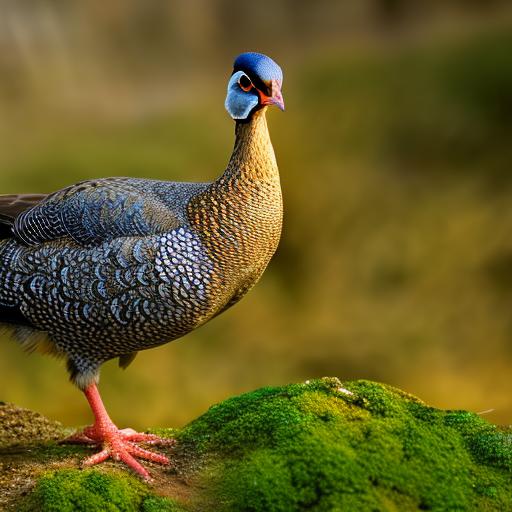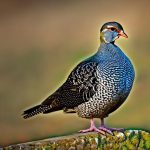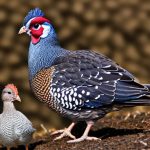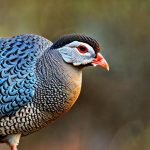Guinea fowl, also known as guinea hen or pintade, are birds native to the African continent. They belong to the Numididae family and are closely related to other game birds such as pheasants and turkeys. Guinea fowl are known for their distinctive appearance, with a small, featherless head and a bony casque on top. They have a compact, plump body and are covered in speckled feathers that come in a variety of colors, including white, black, and various shades of gray and brown. Guinea fowl are popular for their delicious meat and eggs, and they are also valued for their ability to control pests in agricultural settings.
Guinea fowl are social birds that prefer to live in flocks, and they are known for their loud, distinctive calls that can be heard from a distance. They are highly adaptable and can thrive in a variety of environments, from open grasslands to wooded areas. Guinea fowl are also known for their strong flying abilities, which allow them to roost in trees at night for protection from predators. These birds are hardy and low-maintenance, making them a popular choice for small-scale farmers and homesteaders looking for natural pest control and sustainable food sources.
Key Takeaways
- Guinea fowl are domesticated birds known for their pest control abilities and distinctive appearance.
- Guinea fowl are highly social birds with a strong flock mentality and are known for their loud calls and alert nature.
- Guinea fowl are effective snake predators, using their keen eyesight and quick movements to catch and kill snakes.
- Guinea fowl’s natural predation on snakes can help reduce snake populations in areas where they are kept.
- Keeping guinea fowl can provide natural snake control, reduce the risk of snake bites, and offer other benefits such as pest control and egg production.
Guinea Fowl Behavior and Characteristics
Guinea fowl are highly social birds that thrive in flocks, and they have a strong pecking order within their groups. They are active foragers that spend their days searching for insects, seeds, and small invertebrates on the ground. Guinea fowl are known for their keen eyesight and sharp hearing, which make them excellent at detecting potential threats in their environment. They are also highly vocal birds, using a variety of calls to communicate with each other and alert the flock to potential dangers.
In addition to their foraging abilities, guinea fowl are also known for their strong flight capabilities. They are able to fly short distances at high speeds, making them adept at escaping predators and navigating their surroundings. Guinea fowl are also known for their strong maternal instincts, with females fiercely protecting their young from potential threats. Overall, guinea fowl are hardy, adaptable birds with a strong sense of community and a natural inclination towards pest control.
Guinea Fowl as Snake Predators
Guinea fowl are natural predators of snakes, using their keen eyesight and quick reflexes to detect and capture these reptiles. Snakes are a common threat to poultry and other small animals, making guinea fowl an invaluable asset in keeping snake populations in check. Guinea fowl are known for their ability to detect snakes from a distance and emit loud warning calls to alert the rest of the flock. Once a snake is spotted, guinea fowl will often band together to mob the intruder, pecking and harassing it until it is either killed or driven away.
Guinea fowl have a particular aversion to snakes and will actively seek them out in their environment. This behavior makes them highly effective at controlling snake populations in areas where they are allowed to roam freely. Their natural instincts as snake predators make guinea fowl an ideal choice for farmers and homesteaders looking to protect their poultry and other small animals from snake attacks.
Guinea Fowl’s Impact on Snake Population
The presence of guinea fowl in an area can have a significant impact on local snake populations. Guinea fowl are highly effective at detecting and deterring snakes, making it difficult for these reptiles to thrive in areas where guinea fowl are present. The loud warning calls of guinea fowl can alert other animals to the presence of snakes, helping to create a safer environment for poultry and other small animals.
In addition to their ability to deter snakes through vocalizations, guinea fowl also actively hunt and consume snakes as part of their natural diet. This predatory behavior can help to reduce snake populations in areas where guinea fowl are allowed to roam freely. By actively seeking out and consuming snakes, guinea fowl play a crucial role in maintaining ecological balance and reducing the threat of snake attacks on other animals.
Benefits of Keeping Guinea Fowl to Deter Snakes
There are numerous benefits to keeping guinea fowl as a natural deterrent to snakes. One of the primary benefits is the reduction of snake populations in agricultural and residential areas. By actively hunting and consuming snakes, guinea fowl help to create a safer environment for poultry, small animals, and humans. This can lead to decreased instances of snake attacks on livestock and pets, as well as reduced risk of snake bites for humans.
In addition to their role as snake predators, guinea fowl also provide valuable pest control services. These birds are voracious insect eaters, consuming large quantities of ticks, grasshoppers, and other pests that can be harmful to crops and gardens. By keeping guinea fowl on the property, farmers and gardeners can benefit from reduced pest pressure and healthier plants. Guinea fowl also produce delicious eggs and meat, making them a valuable addition to small-scale farming operations.
Considerations for Keeping Guinea Fowl
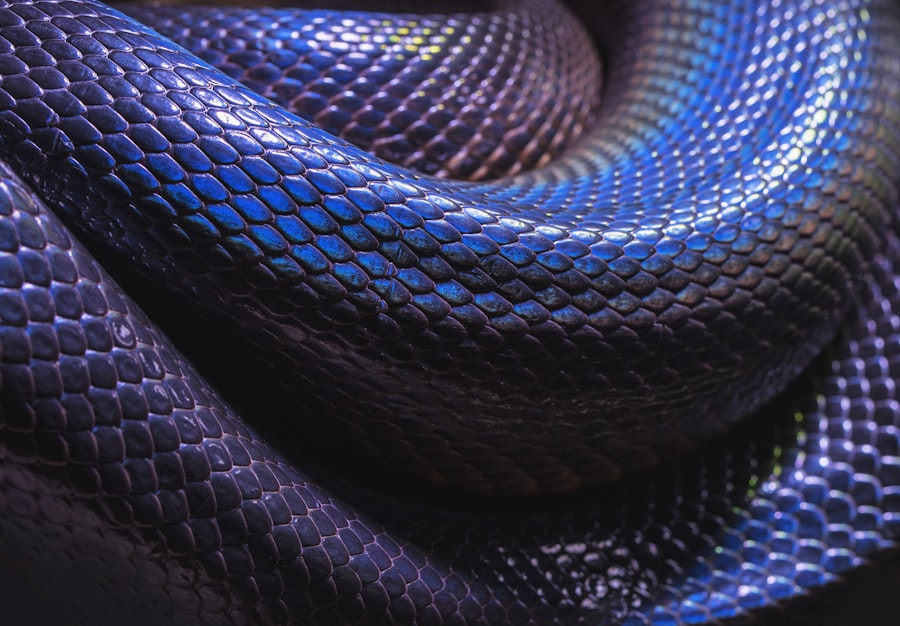
While guinea fowl offer numerous benefits as snake deterrents and pest controllers, there are some important considerations to keep in mind when keeping these birds. Guinea fowl are highly social animals that thrive in flocks, so it is important to provide them with ample space to roam and interact with each other. They also require protection from predators such as foxes, raccoons, and birds of prey, so secure housing is essential for keeping guinea fowl safe.
Guinea fowl can be noisy birds, especially when they feel threatened or when they detect potential dangers in their environment. This can be a consideration for those living in close proximity to neighbors or in urban areas where noise may be an issue. Additionally, guinea fowl have a strong instinct to roost in trees at night, so providing suitable roosting options is important for their well-being.
In conclusion, guinea fowl are highly effective natural deterrents to snakes and provide valuable pest control services for agricultural and residential settings. By actively hunting and consuming snakes, guinea fowl help to create a safer environment for poultry, small animals, and humans. Additionally, their voracious appetite for insects makes them valuable allies in controlling pest populations. While there are some considerations to keep in mind when keeping guinea fowl, the benefits they provide make them a valuable addition to any farm or homestead looking for natural pest control solutions.
Looking for natural pest control in your poultry area? Consider adding guinea fowl to your flock. These birds are known for their ability to keep snakes away, making them a valuable addition to any farm or homestead. If you’re interested in learning more about the benefits of keeping guinea fowl, check out this informative article on PoultryWizard.
FAQs
What are guinea fowl?
Guinea fowl are a type of bird native to Africa. They are known for their distinctive spotted feathers and loud, chattering calls.
Do guinea fowl keep snakes away?
Guinea fowl are known to be effective at keeping snakes away from an area. Their loud calls and alert nature make them excellent at spotting and deterring snakes.
How do guinea fowl keep snakes away?
Guinea fowl are naturally vigilant and will sound the alarm if they spot a snake. Their loud calls and aggressive behavior can intimidate snakes and drive them away from the area.
Are guinea fowl a good natural pest control option?
Yes, guinea fowl are excellent at controlling insect and rodent populations. They are voracious eaters and will consume a wide variety of pests, making them a valuable addition to a farm or garden.
Do guinea fowl require special care or housing?
Guinea fowl are relatively low-maintenance birds and can be kept in a simple coop or free-range environment. They are hardy and adaptable, but may require protection from predators such as foxes and hawks.
Meet Walter, the feathered-friend fanatic of Florida! Nestled in the sunshine state, Walter struts through life with his feathered companions, clucking his way to happiness. With a coop that’s fancier than a five-star hotel, he’s the Don Juan of the chicken world. When he’s not teaching his hens to do the cha-cha, you’ll find him in a heated debate with his prized rooster, Sir Clucks-a-Lot. Walter’s poultry passion is no yolk; he’s the sunny-side-up guy you never knew you needed in your flock of friends!

